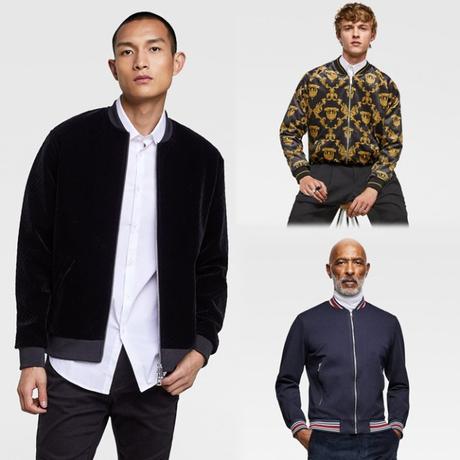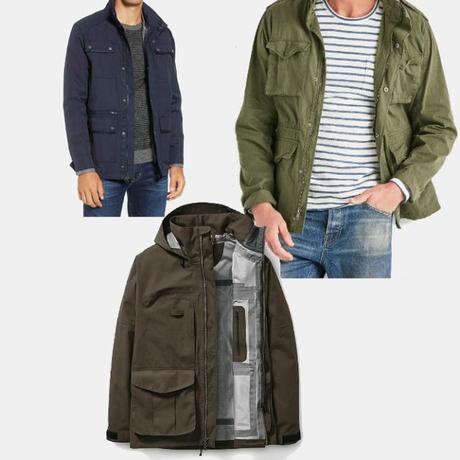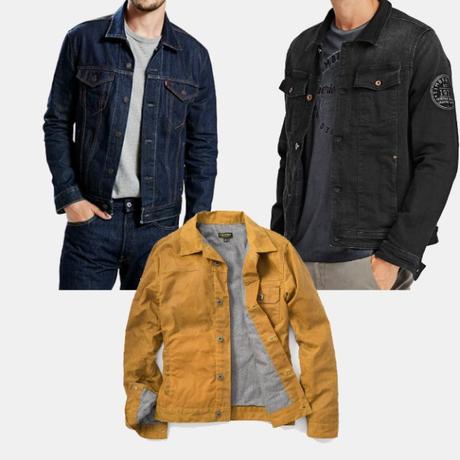To define lightweight jackets, we can say that these are jackets that have a very soft and fine feel to them: they are not bulky, they are made from fabrics that adapt easily to different temperatures and they feel light when worn.
Not only are such jackets great for spring, summer and autumn, but they are also great for traveling, as they don't take much space in your luggage, nor do they add much weight to it.
Lightweight jackets often fall in the "transitional" category of fashion or in the "versatile". Surely, some styles are more versatile than others, which is why we're going to take a look at the main styles you'll meet.
To many people, bomber jackets are those puffy winter items; however, the also have a very lightweight version. In essence, lightweight bomber jackets are very similar to zip-up vests, with added sleeves.

Bomber jackets are also known as the MA-1, as they trace their lineage back to military pilot's uniforms in WWII. Their military angle makes them very functional and practical (they usually feature two large front pockets which can be closed with zippers and an elastic waist that will keep you warm) and will give you a bit of an edge from a visual point of view, as they still carry a bit of the original military vibe with them.
Today, you'll find bomber jackets made from a wide variety of materials, from leather to polyester and even suede. You can also find bomber jackets in a range of colors and prints. This way, you can work with the interplay between the jacket's military aesthetic and a contrasting print or color.
The reason why bomber jackets are cool is because you can mix and match them with many types of items, from jeans and chinos to oxford shirts and dress shirts, even though they should be always kept within the casual realm.
Another military-inspired jacket is the field jacket. The utility jacket, safari jacket or M65 as it is also called is a jacket that is slightly longer than a bomber jacket, more relaxed and features many pockets. This type of jacket is great for a rainy day. It can also be worn on a day-to-day basis by those who carry many things with them and need to have them always handy.

Safari jackets are usually more casual than bomber jackets. They come in olive green or navy blue, but you will often find them in dark brown, black or gray. These jackets are quite casual in terms of style, they work well with jeans and sweaters or even classic shirts.
Safari jackets may seem a hiking piece to many, but they actually come in very handy to men who work outside a lot: think constructions, sporting events organizers, etc.
As their name says, trucker jackets are inspired and derived from jackets worn by truckers. They are similar to bomber jackets in that they were born from utility and that they are shorter. Trucker jackets usually feature a button or zip front, a fabric-covered collar and flap pockets in the front.

They are usually made from strong waxed cotton or canvas, but you will also find them made from denim or nylon.
These jackets are somewhat in the middle between bomber jackets and safari jackets. They offer a sleek and simple style, but are strong and protective. They are casual and go with anything from jeans to chinos and from simple sweaters to simple dress shirts and are designed for men who want to combine utility and style.
There are many versions and styles of lightweight jackets in the world, many combinations and many innovative styles, but one thing is certain: a light jacket can be of tremendous help on many occasions and will come in very handy in many types of weather.
Thus, having one or more lightweight jackets in your closet (in various styles, colors and fabrics) can turn out to be much to your advantage.
Fraquoh and Franchomme
Further reading:
6 reasons to get a leather jacket A guide to men's winter jackets How to transition your wardrobe from summer to autumnP.S. We want to hear from you! Do you have a lightweight jacket? What type is it? Why did you choose this style? Share your feedback, questions or thoughts in the comments below! For more articles on style, fashion tips and cultural insights, you can subscribe to Attire Club via e-mail or follow us on Facebook, Twitter or Instagram!

